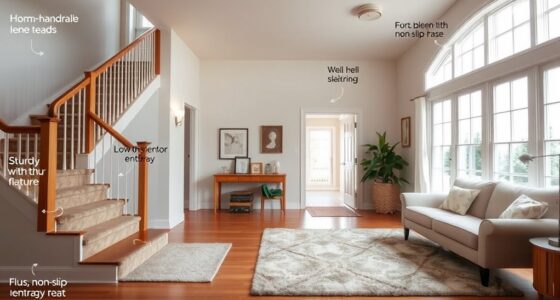Smart home technologies can really simplify aging in place for you or your loved ones. These devices enhance safety, promote independence, and help you stay connected. Smart smoke detectors, automated lighting, and health monitoring systems prevent accidents and alert you to emergencies. Plus, they allow remote monitoring, reducing the need for caregivers. With user-friendly solutions, you can easily enjoy a more secure and comfortable living environment. Discover how to incorporate these technologies into daily life for even more benefits.
Key Takeaways
- Smart smoke detectors and home security systems provide instant alerts, enhancing safety for seniors living alone and preventing emergencies.
- Voice-activated technology allows seniors to control their home environment hands-free, simplifying daily routines and promoting independence.
- Smart health monitoring devices track vital signs and alert caregivers to changes, enabling timely interventions for better health management.
- Fall detection sensors automatically alert emergency contacts, ensuring immediate assistance and reducing the risks associated with falls at home.
- Smart medication dispensers offer reminders and ensure timely intake, helping seniors manage their medications effectively and maintain their health.
Understanding Smart Home Technology for Seniors
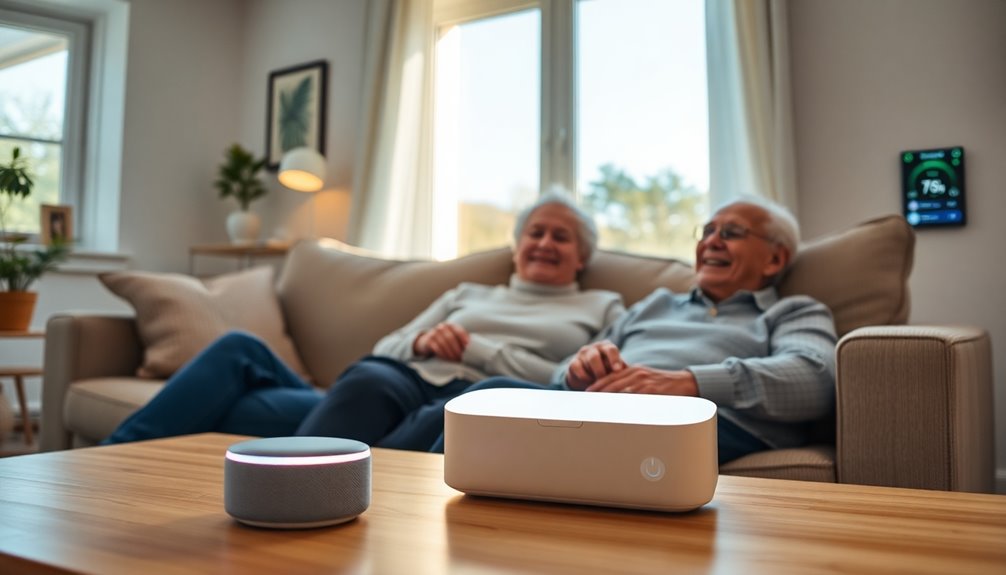
As you explore smart home technology, you'll discover how it can empower seniors to maintain their independence while aging in place. This innovative technology utilizes internet-connected smart devices to automate daily tasks and enhance safety.
With approximately 9 in 10 older adults wanting to stay in their homes, user-friendly solutions are vital. Safety devices like fall detection systems and automated lighting are essential, as over a quarter of seniors experience falls each year.
Additionally, smart home technology improves health monitoring, allowing seniors to use data from devices to identify behavioral changes and health issues early. By addressing digital barriers, these solutions help seniors navigate their environments confidently, ensuring a safer and more independent lifestyle.
Key Benefits of Smart Home Devices
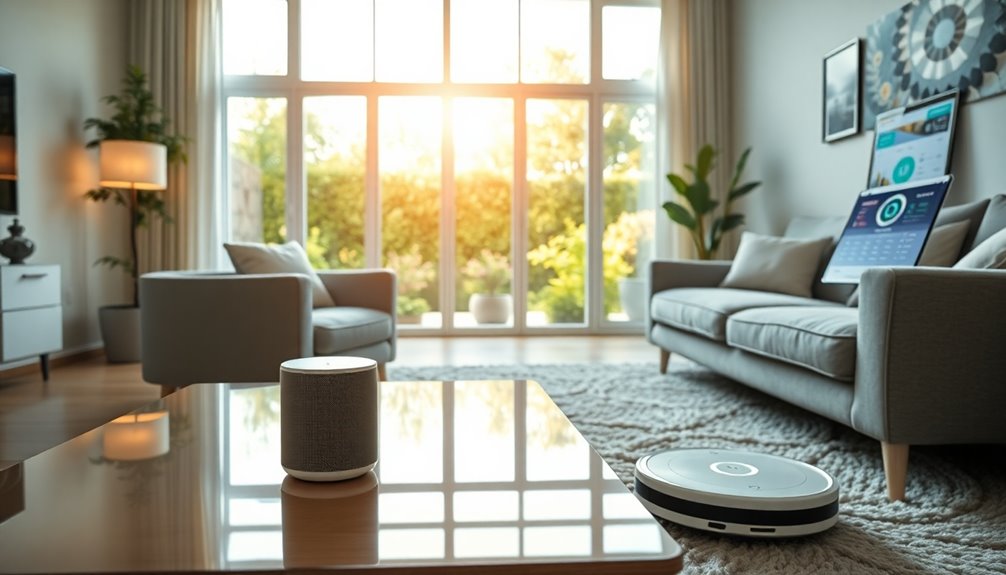
Smart home devices offer numerous benefits that greatly enhance the quality of life for seniors.
With features like smart lighting and motion sensors, you can reduce fall risks by ensuring well-lit pathways during nighttime navigation.
Health monitoring systems, such as smart pill dispensers, help you manage medications independently while keeping caregivers informed.
Integrated security cameras provide real-time monitoring, giving you peace of mind by allowing you to verify visitors remotely.
Voice assistants make daily life easier by enabling hands-free control of various devices, from adjusting lighting to making calls.
Plus, automated reminders for daily tasks simplify household management, allowing you to focus on what truly matters.
Embracing these technologies can considerably improve your safety and overall well-being. Additionally, incorporating air purifiers into your home can further enhance indoor air quality, contributing to a healthier living environment for seniors.
Essential Devices for Aging in Place
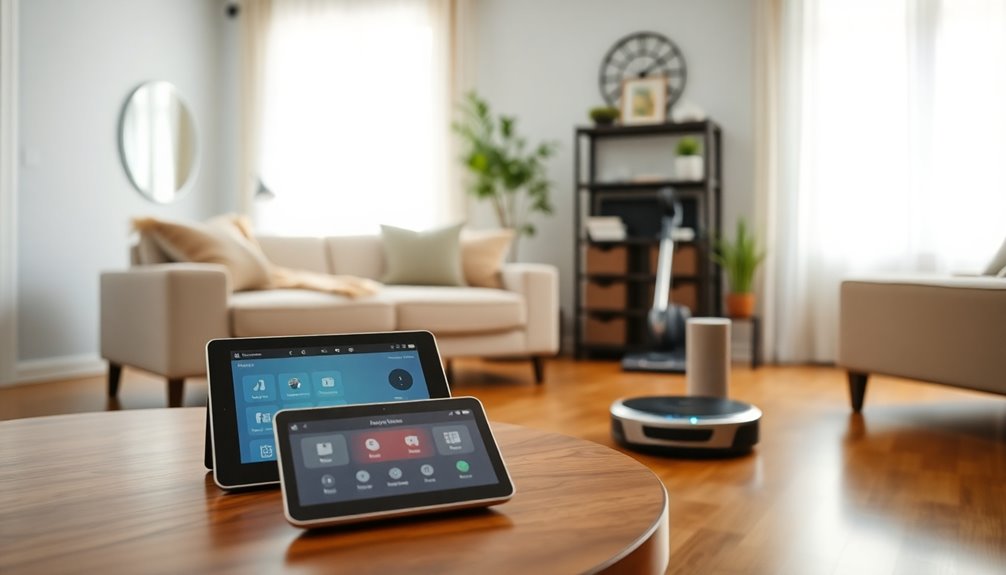
When it comes to aging in place, essential devices can make a world of difference in your safety and comfort.
You'll find that smart security features and health monitoring solutions not only enhance your well-being but also ease the worries of your loved ones. Additionally, integrating heat pump technology can significantly improve home energy efficiency, providing a comfortable living environment year-round.
Let's explore how these technologies can support your daily living and promote independence.
Safety and Security Devices
Ensuring safety and security at home is essential for older adults who wish to age in place independently. Smart smoke detectors and home security systems enhance your safety and well-being by providing instant alerts if smoke or carbon monoxide is detected.
You can install smart locks and contact sensors to allow seniors to control and monitor your home, managing access remotely while receiving alerts about unusual activity.
With more than one in four older adults experiencing falls, smart lighting solutions can illuminate dark areas, preventing accidents.
Plus, emergency contact systems, like the Apple Watch SE, can automatically notify your emergency contacts, potentially saving lives in critical situations. Additionally, incorporating air purifiers with HEPA filters can further improve indoor air quality, promoting better health for seniors and reducing respiratory issues.
These devices create a safer living environment, giving you peace of mind.
Health Monitoring Solutions
Health monitoring solutions play an indispensable role in helping older adults age in place with confidence.
Smart health monitoring systems, like smart scales and heart rate monitors, track crucial signs and alert caregivers to concerning changes, enabling proactive management of health conditions.
Wearable health devices, such as fitness trackers and smartwatches, monitor physical activity and sleep patterns, offering insights that help maintain well-being.
Smart medication dispensers guarantee seniors take their medications on time with automated reminders, reducing missed doses.
Integrated environmental sensors, including air quality and temperature alerts, notify you and caregivers of potential hazards at home.
Finally, fall detection sensors instantly alert emergency contacts, providing immediate assistance and enhancing safety for seniors living independently. Additionally, engaging in regular exercise contributes to overall health and can prevent various aging-related issues.
Daily Living Enhancements
As older adults embrace technology for health monitoring, smart home devices also enhance daily living, making it easier to maintain independence.
Smart lighting systems equipped with motion sensors illuminate dark areas, reducing fall risks at night.
Smart pill dispensers guarantee effective medication management by providing reminders and managing dosages, helping you stay on schedule.
Voice-controlled smart speakers allow you to adjust lighting, control appliances, or make calls hands-free, promoting greater autonomy.
Smart home security cameras let family members monitor your safety remotely, enhancing overall security.
Automated smart thermostats learn your preferences and can be adjusted from anywhere, assuring comfort while saving energy.
Together, these technologies create a safer, more convenient living environment as you age in place.
Enhancing Safety With Smart Technology
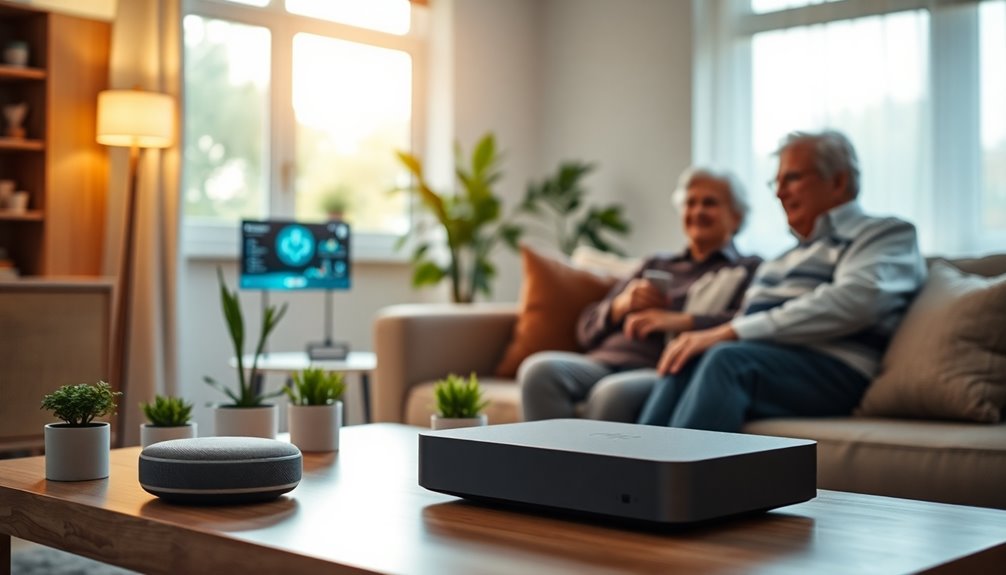
Smart technology plays an essential role in enhancing safety for seniors aging in place, making it easier for them to live independently.
Smart home safety devices, like automated lighting with motion sensors, illuminate pathways at night, reducing fall risks. Fall detection sensors can alert emergency contacts instantly if a fall occurs, ensuring timely help.
Smart smoke and carbon monoxide detectors provide immediate alerts and can automate emergency responses, greatly improving safety during hazardous situations.
Smart doorbells and security cameras let you verify visitors without opening the door, boosting personal safety.
Additionally, environmental sensors monitor air quality and detect dangerous conditions, keeping you informed about potential hazards in your home.
Moreover, the presence of security systems can deter potential intruders, increasing overall safety within the living environment.
These technologies empower you to maintain a secure living environment while aging in place.
Improving Daily Life Through Automation
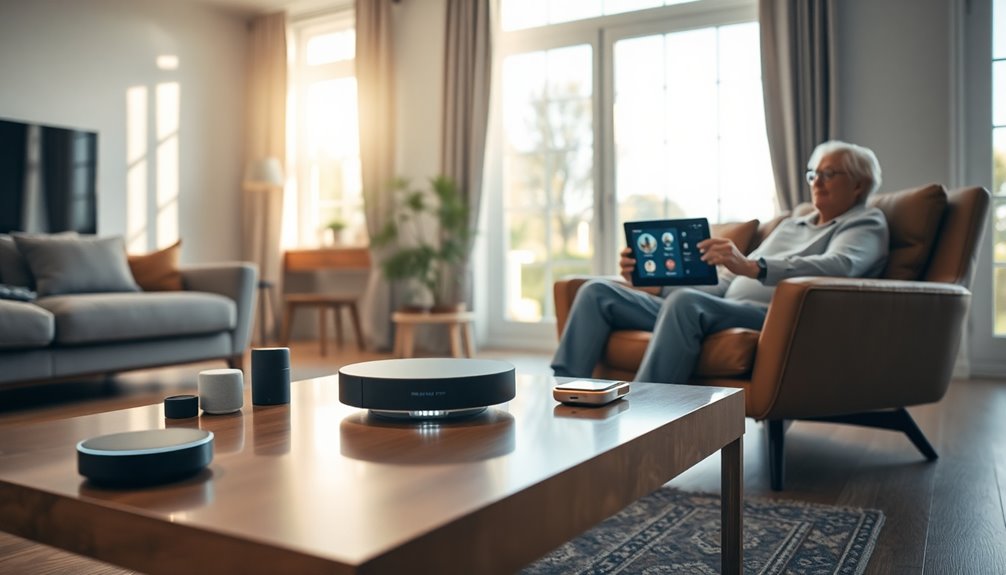
With smart home automation, you can enhance safety and streamline your daily routines. Features like motion-sensing lights and voice-controlled assistants allow you to navigate your home with confidence and ease. These technologies not only make life more convenient but also help you maintain independence while reducing risks. Additionally, open communication about emotional needs can significantly improve the quality of life for aging individuals.
Enhanced Safety Features
When you embrace enhanced safety features in your home, you create a more secure environment that can greatly improve daily life for seniors. These enhancements can include better lighting, nonslip flooring, and the installation of grab bars in key areas, all of which contribute to reducing the risk of falls and injuries. By incorporating senior safety home upgrades, families can ensure that their loved ones maintain independence while living comfortably and confidently in their own space. Investing in these features not only provides peace of mind but also fosters a sense of dignity and autonomy in daily activities.
Smart home technology, like automated door locks, offers keyless entry and remote access control, enhancing security and convenience. Motion sensors activate automated lighting systems, illuminating pathways at night and reducing fall risks.
Security cameras provide real-time monitoring, letting you verify visitors without opening the door, which boosts personal safety. Additionally, smart smoke detectors send instant alerts to your smartphone and can automate emergency responses, ensuring timely action during hazards.
Health monitoring systems sync with wearables to give regular health updates, facilitating early intervention if any irregularities are detected. Furthermore, integrating systems like best home security systems can enhance overall safety by providing comprehensive protection against potential threats.
These features work together to create a safer living space.
Seamless Daily Routines
Creating a safe environment sets the stage for a more comfortable daily life.
With smart home devices, you can automate daily tasks that enhance your independence and peace of mind. Voice technology makes it easy to control your home hands-free, allowing you to focus on what matters most.
Consider these benefits for seamless routines:
- Automated reminders for daily medications and appointments
- Motion-sensor lighting to prevent falls during nighttime navigation
- Smart irrigation systems for effortless garden maintenance
- Home monitoring systems that alert you to security threats or hazards
These technologies support the aging population, promoting a secure and efficient senior living experience. Additionally, integrating smart utilities can enhance energy efficiency and comfort in your home.
Embracing automation can transform your daily routines into a smoother, safer journey.
Health Monitoring and Social Connectivity
Health monitoring and social connectivity are essential for seniors aging in place, ensuring their well-being and reducing feelings of isolation.
Integrated health monitoring systems sync with medical devices to track crucial signs, allowing for timely interventions when needed. Smart medication management devices help you remember to take your meds on time, promoting adherence to your health regimen.
Fall detection sensors alert emergency contacts automatically if you fall, ensuring you get help quickly. Video calling integration with smart displays makes it easy to connect with loved ones, enhancing social connectivity.
Additionally, environmental sensors monitor air quality and notify you of potential health hazards, contributing to a safer living environment and overall well-being. Newborn sleep patterns can also be relevant for understanding the importance of rest and routine in maintaining health as we age.
These technologies empower you to live independently while staying connected and healthy.
Overcoming Adoption Challenges
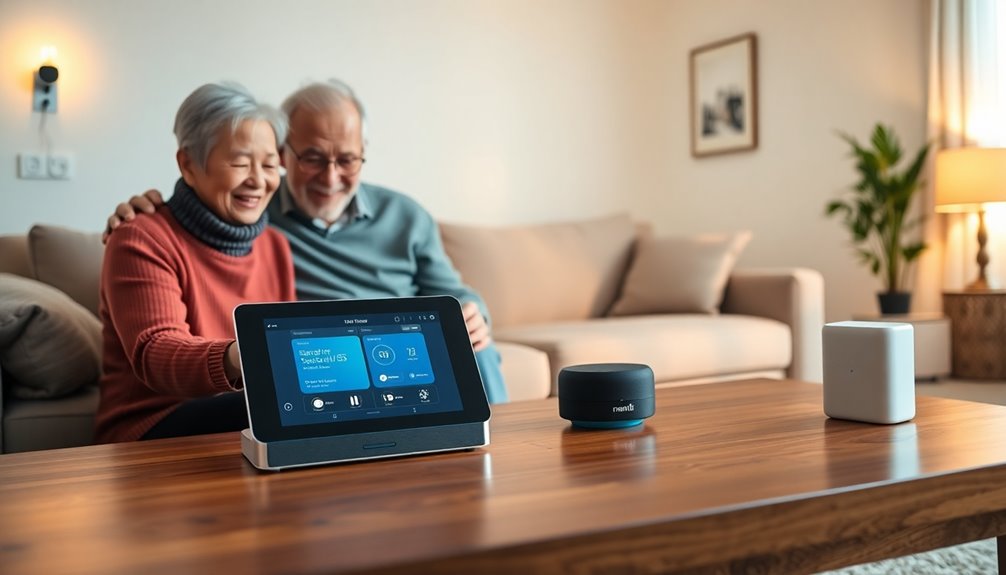
When considering smart home technologies, you might face challenges like high costs, complicated setups, and concerns about privacy and security.
These obstacles can make it tough to embrace the benefits of smart devices for aging in place.
Let's explore how to tackle these issues effectively.
Cost and Affordability Issues
Although many older adults want to age in place, cost and affordability issues often stand in the way of adopting smart home technologies. Financial constraints can make it tough to access necessary safety devices, leading to a reluctance to invest in smart home devices.
Here are some ways to overcome these challenges:
- Explore affordable options through community support programs.
- Stay informed about the Matter standard to reduce compatibility issues.
- Consider a phased approach when purchasing devices to better manage costs.
- Seek assistance from local organizations that help seniors understand and implement technology.
Complexity of Device Setup
For many older adults, the promise of smart home technologies is often overshadowed by the complexities of setting them up.
Setup complexities can discourage you from adopting smart home devices, especially when connecting multiple devices proves challenging. Many older adults struggle with device compatibility, leading to frustration and the need for technical assistance.
This piecemeal approach can complicate home automation, making it feel overwhelming rather than beneficial.
Fortunately, the industry is working on a technical standard called Matter, which aims to simplify device compatibility and enhance user experience.
Privacy and Security Concerns
As you consider adopting smart home technologies, privacy and security concerns can loom large, particularly for older adults who may be more vulnerable to cyber threats.
To help seniors navigate these challenges, focus on implementing effective security measures:
- Change default usernames and passwords
- Set up encryption and two-factor authentication
- Regularly update device software
- Educate on monitoring device activity and recognizing phishing attempts
Additionally, understanding the importance of strong encryption standards can significantly enhance the protection of personal information.
Security and Privacy Considerations
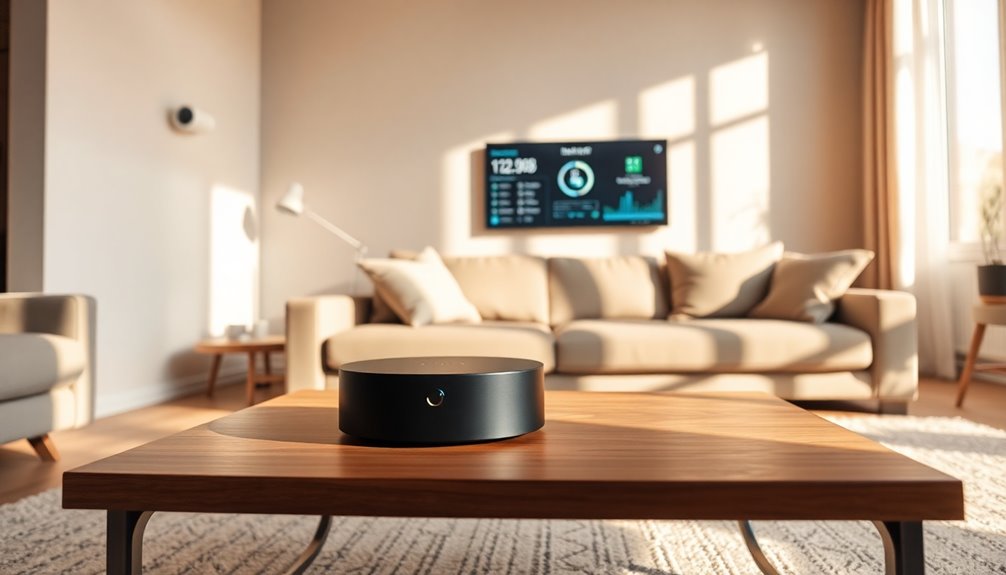
While smart home technologies offer numerous benefits for seniors aging in place, security and privacy considerations are essential to guarantee their safety. Seniors are particularly vulnerable to cybercrime, making it imperative for you to implement strong security measures.
Start by enabling two-factor authentication on your smart home devices, as this adds an extra layer of protection against unauthorized access. Regularly updating device software helps defend against potential threats.
It's also important to change default usernames and passwords to protect your personal data. Monitoring device activity and utilizing encryption can further enhance your security, ensuring a safer environment as you age in place.
Stay informed and proactive about these measures to enjoy your smart home confidently.
Integrating Smart Devices for Comprehensive Care
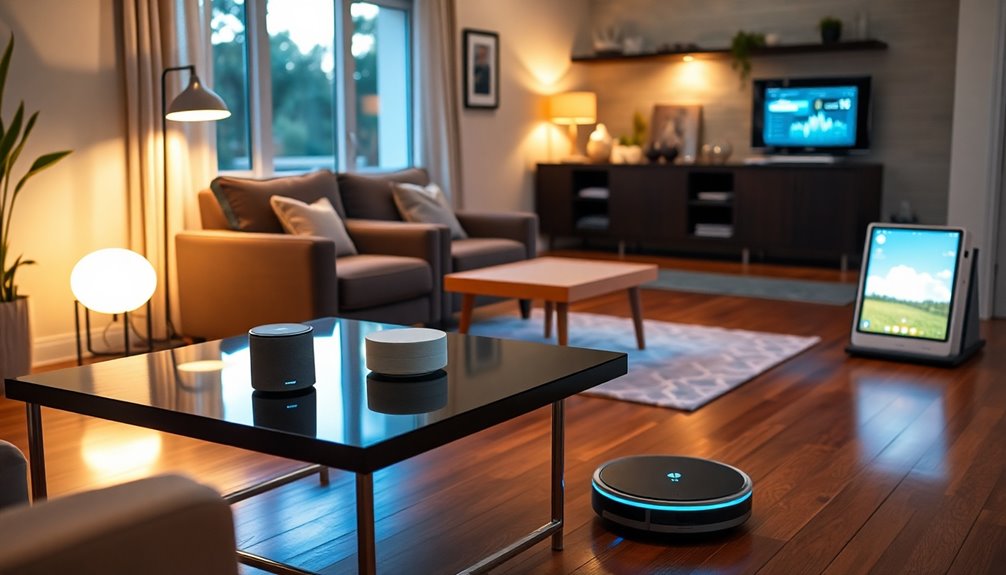
Integrating smart devices in your home can greatly enhance the care and support available to older adults. By linking various smart home devices, you create a thorough system that benefits both seniors and their caregivers. This integration can help detect unusual patterns, guaranteeing timely interventions when needed.
Consider these advantages:
- Health monitors track essential signs and alert caregivers to changes.
- Medication dispensers provide reminders and guarantee timely medication intake.
- Smart lights and security cameras enhance safety, reducing fall risks.
- Data from these devices reveal behavioral changes, serving as an early warning system for health issues.
With smart technology, you can make aging in place safer and more comfortable for your loved ones.
Future Trends in Smart Home Innovations for Seniors
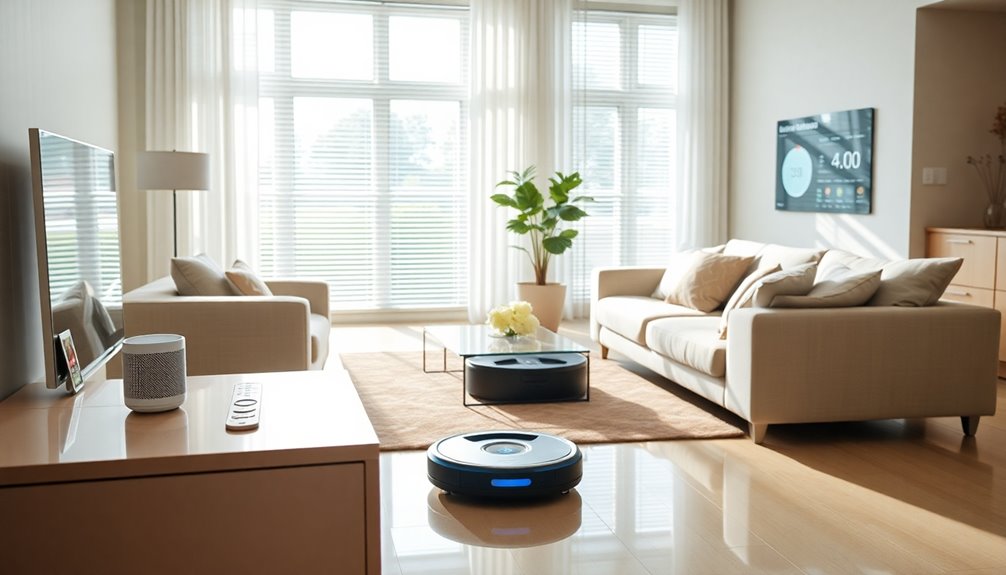
The landscape of smart home technology is rapidly evolving, promising a future that enhances the lives of seniors living independently.
Upcoming smart home innovations will likely feature advanced health monitoring devices, seamlessly integrating with medical systems to track essential signs in real-time. Artificial intelligence will learn your daily routines, providing personalized reminders for medications and appointments.
Enhanced interoperability among smart devices will simplify user experiences, making it easier for you and your caregivers to manage your home. Voice recognition technology will improve accessibility, allowing intuitive control through natural language commands.
Additionally, the rise of affordable smart devices, coupled with community support programs, will encourage greater adoption, ensuring you can enjoy safety and convenience while aging in place.
Frequently Asked Questions
What Are the Digital Technologies to Enable Aging in Place?
When you think about digital technologies that enable aging in place, consider tools like health monitoring devices that track essential signs or smart medication dispensers that remind you when to take your pills.
Automated lighting systems can help prevent falls during the night, while home security features allow you to keep an eye on your surroundings.
These technologies can enhance your independence, making daily life more manageable and secure as you age.
How to Design a Home for Aging in Place?
Designing a home for aging in place is like constructing a fortress of comfort.
You'll want wide doorways for easy access, zero-step entrances to eliminate tripping hazards, and a single-level layout to avoid those dreaded stairs.
Install smart lighting that springs to life at night, ensuring you never stumble in the dark.
Add voice-controlled devices for effortless adjustments, and don't forget emergency systems for peace of mind.
Your home should be your sanctuary!
What Is the Aging in Place Program?
The Aging in Place program helps older adults live independently in their homes.
It offers resources and services tailored to your needs, from home modifications to personal care assistance.
You'll find that most seniors prefer this option over moving to assisted living facilities.
Can Smart Home Technologies Help Older Adults Manage Their Chronic Condition?
Yes, smart home technologies can definitely help you manage chronic conditions. They send medication reminders and guarantee you're taking the right dosages, reducing the chance of mistakes.
Wearable devices track your essential signs, alerting you or your caregivers if something's off. You can also set automated reminders for appointments, keeping you organized and on track with your treatment plan.
Conclusion
Embracing smart home technologies can truly transform the way you age in place, making life easier and safer. Imagine a future where your home anticipates your needs, just like your favorite sitcom characters always seemed to know what would happen next. By integrating these devices, you can enjoy greater independence and peace of mind. So, take the plunge into this tech-savvy world—it's not just about convenience, it's about living life on your own terms.




